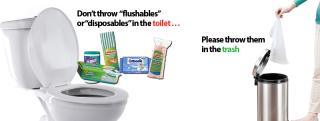Wipes Disposal

IMPORTANT REMINDER
Don’t Flush Trouble
Since 2014, Wyoming Valley Sanitary Authority (WVSA) has seen a significant increase in flushed products that can wreak havoc on wastewater management operations. Actually, thousands of wet wipes are being pulled from local sewage drains each week. While many products such as wet wipes may be marketed as “flushable” or “disposable,” these products are not decomposable. Only toilet paper and body fluids should be flushed down toilets. The best place for wipes? In the trash...
Keep Things Moving Underground (Source: PA Department of Environmental Protection)
The average lifespan of a septic system is estimated at 15 to 40 years, but it may last longer if properly maintained. Just like changing the oil in your car, maintaining your septic system extends its life for a small cost compared to the expense of installing a new system, which typically runs $15,000 or more.
Think at the sink, and don’t overload the commode. Consider what you put down your sink and toilet. Limit the use of your garbage disposal. Avoid using common household items that can clog your system or kill the microbes underground that you need to treat the wastewater:
- “System Cloggers” -- diapers, baby wipes (even ones marketed as “flushable”), cat litter, cigarettes, coffee grounds, fats, grease, solids, feminine hygiene products, and prophylactic devices.
- “Treatment Killers” -- household chemicals, gasoline, oil, pesticides, antifreeze, paint, and high amounts of anti-bacterial soaps and detergents.
Remember: Flushing items such as baby wipes can easily block sewer pipes, cause major plumbing problems, and compromise your town's sewer and septic tank systems.
To learn more, view WNEP-16's Power to Save: "Be Careful of What You Flush" segment, filmed on location at WVSA.

